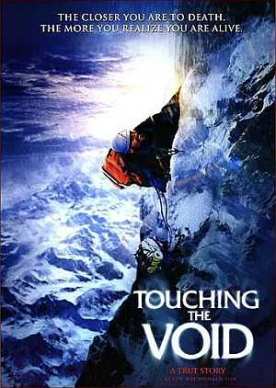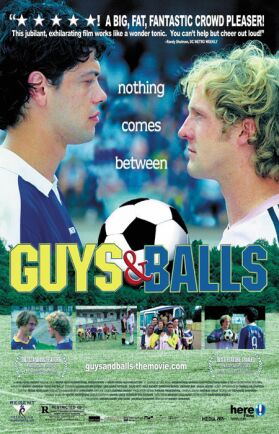Touching the Void
The title of Touching the Void by Kevin Macdonald can refer either to the “void” into which you fall when you fall off a mountain, as the British mountaineer Joe Simpson did in the Andes in 1985, or to the vast empty space of eternity which Simpson expected to occupy when he died from the fall — as he should have done but miraculously didn’t. Mr Macdonald has both the real-life Mr Simpson and his climbing partner Simon Yates on screen to tell us their story as well as a couple of actors, Brendan Mackey and Nicholas Aaron, as their younger selves re-enacting it. The combination is absolutely mesmerizing. Apparently it was an emotional experience for Messrs Simpson and Yates to return to the scene of the drama, and it shows in Macdonald’s tight close-ups of their faces.
The two had climbed the hitherto unclimbed 20,000 foot-plus west face of Siula Grande in Peru and were on their way back down when Simpson’s ice-axe pulled loose on a sheer face and he fell far enough to drive his right shin bone right through his knee joint. He knew at once that his chances of getting down with such a badly broken leg were slight, but Simon Yates stuck with him and the two together worked out a cumbersome method by which Yates would lower his partner to the length of the rope they had — 300 feet — make sure he was situated on firm ground, then come down to his level and do it again.
They had come to within a few hundred feet of the glacier from where they knew they could make it back to their base camp when a much worse thing happened. It was late in the day and they were in the midst of a snowstorm. As Simpson was being lowered whither he couldn’t see, he went over a ledge and found himself dangling in mid-air. He shouted and called to Yates above him, but the latter couldn’t hear. As he waited in vain for the signal, a tug on the rope, that Simpson had landed on firm ground, Yates found his own foothold slipping. He had no way of knowing if Simpson was alive or dead, but he knew that they would both be dead if he himself were pulled off the mountain. So he took out a knife and cut the rope.
In mountaineering circles, we are told, Yates has been known ever since as “the man who cut the rope.” Some have shunned him for it. Yet when, having fallen into a crevasse and onto a snow ledge and having crawled out of it and back the several miles to the base camp some days later, Simpson, more dead than alive, said to Yates: “I’d have done the same thing.”
For all this gripping film’s spectacular photography, its most gripping moments come as Simpson describes in calm and measured tones what went through his mind as he dangled at the end of the rope, as he lay at the bottom of the crevasse, and as he crawled agonizingly across miles of ice-field. For most of the time there was no doubt in his mind that he would die, yet he wouldn’t — or couldn’t — give up. Once he was at the point of lying down to die when a pop tune he hated, “Brown Girl in the Ring” by the Irish group Boney M started going through his head. “Bloody hell!” he remembers thinking. “I’m going to die to Boney M!” So he kept on going.
Most strikingly to me, as a lapsed Catholic Simpson says he had often wondered whether, in extremis, he would want to say a few tentative Hail Marys, but when he thought he knew with certainty that he would die the thought “never once occurred to me. It meant I really don’t believe,” he says. Actually, as he crawled over the ice he says he would have found it easier to believe in a malign God, “like somebody teasing an ant, putting things in its way, who was eventually going to stand on it.”
And yet the incredible determination with which he crawled out of the crevasse, down a glacier, over a moraine of boulders and back to camp with a broken leg well, was that just him being “insanely stubborn”? Maybe it is as hard to believe in yourself as it is in God. As Simpson puts it, “You’ve got to go on making decisions; even if they’re wrong decisions. If you don’t make decisions, you’re stuffed. The only alternative was to just sit there blindly hoping it was going to get better — and I knew it wasn’t going to get better.”
That may not be the same thing as faith in God, but you can’t help thinking that God, if He existed, would approve.
Discover more from James Bowman
Subscribe to get the latest posts to your email.






